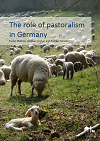Evelyn Mathias, Günther Czerkus and Andreas Schenk.
League for Pastoral Peoples and Endogenous Livestock Development, 2022.
This detailed study of the role of pastoralism in Germany argues that a small number of mobile pastoralists make an outsized contribution to the landscape and environmental conservation in Germany. Around 1,000 full-time shepherds manage some 70% of the national flock, they include transhumant (mobile) shepherds who move long distances between winter and summer pastures, and location-bound herders, who graze their sheep and goats in a more or less wide radius around the homestead. In addition, mountain farming in the Alps involves cattle, plus some sheep, goats and horses moving between summer mountain pastures and winter quarters in the valleys. These herders provide various environmental services, including maintaining landscapes, protecting land from flooding, erosion and fire, and maintaining grassland that preserves the quality of groundwater. Official statistics do not include pastoralism as a management system, so its value and its contribution is largely unrecognized.
The role of pastoralism in Germany
Evelyn Mathias, Günther Czerkus and Andreas Schenk
This study investigates the situation of pastoralism in Germany. It gives an overview of the data sources on livestock and pastoralism in Germany, the pastoralist systems and the definitions of pastoralism used. Germany has three main types of pastoralism: sheep transhumance (Wanderschäferei, the long-distance movement of mobile shepherds and their flocks between winter and summer pastures), location-bound herding (standortgebundene Hütehaltung, where pastoralists graze their sheep and goats in a more or less wide radius around the homestead), and mountain farming (Almwirtschaft, where cattle, plus some sheep, goats and horses, stay with their herder on mountain pastures during the summer months, returning to the valleys in the autumn).
The definitions of the various forms of pastoralism vary from state to state within Germany. There are an estimated 1,000 full-time shepherds in Germany, most of whom are mobile. Smaller enterprises with fewer sheep are less likely to be mobile and more likely to run part-time or hobby operations, or as part of a mixed farm. The 1,000 large, mobile operations graze perhaps 3.4% of Germany’s permanent grasslands.
Livestock products include meat, milk, cheese and wool. These are worth a total of EUR 83.9 million per year for the 1,000 large operations. Environmental services include enhanced biodiversity through seed and insect dispersal, pasture fertilization by the animals’ manure, a dense grass cover, and moderate soil compaction compared to the use of machinery. Taken together, these environmental services are worth between EUR 207 and 347 million – more than the income derived from the sale of products. Other benefits include landscape maintenance for tourism and recreation, improved groundwater quality, and control of erosion, flood and wildfires. It is hard to put an economic value on these benefits.
Mobile herding is declining because of low profitability, a growing shortage of suitable grazing land, attacks by wolves, and excessive bureaucracy. Even though the number of pastoralists in Germany is small, they make a disproportionate contribution to Germany’s economy and environment. More reliable data focusing on pastoralism is needed to obtain a better picture of the status of pastoralism and to provide a basis for efforts to support it.

Download document
